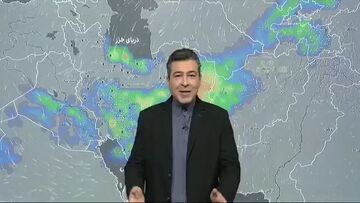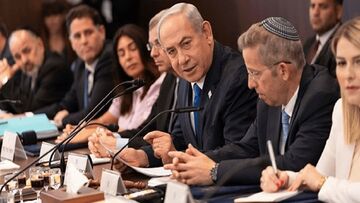TEHRAN(Bazaar) - Professor Arshin Adib-Moghaddam, Chair of the Center for Iranian Studies at the London Middle East Institute believes "Re-negotiating the JCPOA would have made sense for the United States within that strategic context, i.e. to lure Iran away from China (and Russia) and to incentivise the country to play a rather more pragmatic role in the region and beyond."
He adds “The Biden administration is likely to continue with the sanctions, even if Iran would put the missile question on the table.”
Here is the full text of the Bazaar's interview with Professor Arshin Adib-Moghaddam:
Arshin Adib-Moghaddam is Professor in Global Thought and Comparative Philosophies at SOAS, University of London and Fellow of Hughes Hall, University of Cambridge. Educated at the Universities of Hamburg, American (Washington DC) and Cambridge, where he received his MPhil and PhD as a multiple scholarship student, Prof. Adib-Moghaddam was the first Jarvis Doctorow Fellow in International Relations and Peace Studies at St. Edmund Hall and the Department of Politics and International Relations, University of Oxford. Adib-Moghaddam received his Professorship at SOAS within eight years after his PhD as one of the youngest academics in his field.
At Cambridge University, he was elected Honorary Fellow of the Cambridge European Trust Society which was based at Trinity College under the auspices of His Royal Highness, The Duke of Edinburgh. In 2017, he was nominated to the national panel of the Royal Anniversary Trust which evaluates the Queen's Anniversary Prize, the highest form of recognition to higher education institutions in the UK which is announced in an annual ceremony at St. James’s Palace. In 2018, Hughes Hall in the University of Cambridge elected him as a Fellow.
Adib-Moghaddam is a member of several editorial boards, including Third World Quarterly, and he is co-editor in chief, together with Prof. Ali Mirsepassi (New York University), of the Cambridge book series, THE GLOBAL MIDDLE EAST. He is the author of several books, including On the Arab revolts and the Iranian revolution (Bloomsbury, 2013) and Psycho-nationalism (Cambridge University Press, 2017). In addition, he has published over 50 research articles in scientific journals and books and he has given numerous key note lectures all over the world including in Japan, Qatar, Armenia, the United States, Iran, Germany and the UK.
Bazaar: While there was talk about final agreement in the Vienna talks in the next round, no time has been set for the next round of talks and the talks seem to have stalled. What is your assessment?
Adib-Moghaddam: The outcome of the presidential elections in Iran, its engineered process and confinement of democratic choice, puts Iran in a worse bargaining position. This is due to two reasons: First, President-elect Raisi is viewed as a "pariah" by much of the outside world due to his human rights record. Secondly, his administration is unlikely to have the diplomatic skills and will-power to spearhead a new strategy that would open up the options for Iran. Europe in particular will think twice to be seen to get too close to someone like Raisi. The reality is that Iran is now seen as a “lost cause” when it comes to adhering to humanitarian standards for its citizens and in terms of its role in international diplomacy.
Bazaar: For the Obama administration, the JCPOA was the first step in negotiating other issues with Iran. That is, he intended to resolve the nuclear issue first and then move on to other issues. But for Biden, the situation is different, and at the same time as the nuclear talks, he wants to guarantee negotiations on regional issues and so on. Will Biden be successful in this way? 4. Biden's government policy in the Middle East (Persian Gulf) is based on "offshore balancing". Accordingly, the United States intends not to take itself too seriously in the Persian Gulf and to focus on China. The Biden administration's insistence on guaranteeing negotiations on regional and missile issues and Iran's non-acceptance could thwart this policy. What is your opinion on this?
Adib-Moghaddam: In this case, I don’t think Biden was the problem, despite his intransigence. There is a general shift away from the region, as the United States has realised at least since Obama’s pivot to the East, that China has emerged as the increasingly dominant power pole in the international system. Re-negotiating the JCPOA would have made sense for the United States within that strategic context, i.e. to lure Iran away from China (and Russia) and to incentivise the country to play a rather more pragmatic role in the region and beyond. I have explained the dynamics of this new world order in “What is Iran?”. The Biden administration was hoping that the Iranian elections would bring to the fore someone with strategic acumen, someone to work with. Raisi is not that person.
Bazaar: The fact that Biden is linking the nuclear talks to other issues is that if he lifts the sanctions, he will no longer be able to put effective pressure on Iran. Accordingly, the nuclear negotiations are somehow tied to negotiations on Iran's regional and missile issues. Iran also strongly rejects negotiations on regional and missile issues. Iran's president-elect, Ebrahim Raisi, also rejected negotiations on regional and missile issues in his first press conference since winning the election. In such circumstances, is there a possibility of escalating tensions between Iran and the United States and the failure of the negotiations?
Adib-Moghaddam: I don’t think anyone is interested in a military conflict. The Biden administration is likely to continue with the sanctions, even if Iran would put the missile question on the table. Therefore, it makes sense, from an objective scientific perspective, to reject negotiations about Iran’s missiles. However, it will be average Iranians who will continue to suffer the most from both the sanctions regime and the restrictive domestic atmosphere that the elections will bring about.
















نظر شما